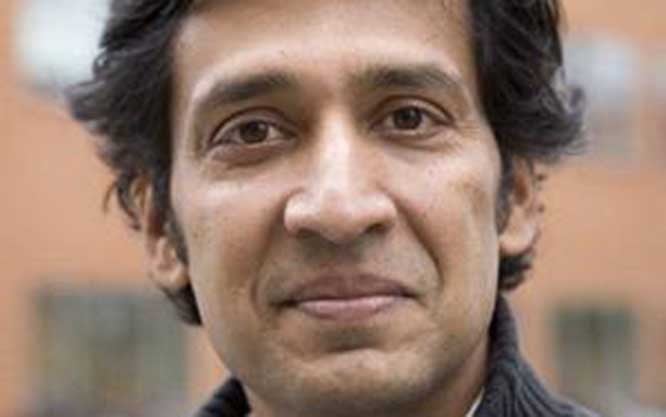
Tabish Khair’s new novel offers a portrait of how intolerance leads us to ‘other’ those who are different from us

Tabish Khair’s Night of Happiness fights the furies of the narrow-mindedness that has laid siege to Indian society. Buoyed by an element of mystery, the novel examines the bigotry that comes with a sense of belonging and the perils of being pushed onto the fringes by an intolerant society.
Khair’s seventh novel begins by directly addressing a reader who enters a hotel room of a "teeming North Indian city" and discovers a handwritten manuscript in the first drawer of a teakwood cabinet. Driven by a soaring curiosity, the reader pulls out the manuscript and is transported by a pragmatic entrepreneur named Anil Mehrotra to a stormy night spent at his office.
As the reader flips through the reams of paper, he realises that this is not Anil’s story; it is the story of Ahmed, his trusted aide. Reticent yet wise, Ahmed is portrayed as an efficient employee who demands little from his boss and is willing to work on major holidays. The only holiday that Ahmed insists on taking is Shab-e-Baraat - the night of salvation and happiness - so that he and his wife Roshni can prepare maida ka halwa. Ignorant about Islam and its festivals, Anil views this as a peculiar request but doesn’t refuse Ahmed his annual holiday.
Night of Happiness takes off on one such Shab-e-Baraat when Anil has asked Ahmed to forsake his holiday and work at the office on account of a financial slowdown. As the storm "growl[s] in the throat of the sky", Anil feels guilty about asking Ahmed to work on his day-off and offers to drop him home. But when Anil enters his loyal aide’s apartment, he is served a plate crammed with nimkis and told that it contains halwa made by Ahmed’s wife. Ahmed’s conversations with Roshni (who Anil never gets to meet) add to his confusion. Anil is eventually left with no option but to watch his host spoon nimkis from his plate and rave about his wife’s halwa.
Perturbed by the incident, Anil hires evi Prasad, a private detective, to conduct a thorough investigation into Ahmed’s tormented past. The covert inquiry reveals astounding details about Ahmed’s life that challenge Anil’s stereotypical perceptions about his Muslim identity.
At first glance, Khair’s latest novel explores a theme that surfaced in one of his previous books How to Fight Islamist Terror from the Missionary Position: the dangers of forming rigid, ill-informed opinions about Muslims. But through a string of chilling insights about the status of Muslims in India, Night of Happiness moves a step beyond Khair’s earlier work, and offers a richly nuanced portrait of how intolerance leads us to make lapses in judgement and ‘other’ those who are different from us.
Ahmed - who is even deprived of a surname by the writer - is compulsively misunderstood by Anil. His boss initially believes that Ahmed has either confined his wife in their flat or is much too unstable. It is only when Anil peels back the layers of mystery surrounding his trusted aide’s life that he learns about the unimaginable horrors which Ahmed confronts on a daily basis.
Anil’s suspicion about Ahmed’s searing past spring from an obvious lack of understanding about his identity as a Muslim. As a Hindu man, Anil is unable to comprehend the turmoil that his Muslim colleague has endured in a secular India that is, oddly enough, fractured along religious lines. Khair’s narrator has a bird’s eye view of the Muslim community’s struggle to survive in such a chaotic environment. This is a compelling device that enables readers to recognise the flaws in the way India’s teeming majority views its trifling minorities. Although the narrator’s curiosities don’t stretch beyond superficial considerations, they succeed in creating the desired effect. Ahmed’s conspicuous absence from the narrative arc also serves to highlight his irrelevance in an increasingly fragmented society.
For a novel that begins with an element of mystery, Night of Happiness fails to produce memorable moments. Once Anil develops an unhealthy obsession with Devi Prasad’s reports about Ahmed’s past, the narrative loses its steam and eventually sags. While this provides a useful opportunity for readers to venture into the narrator’s mind, the plot appears to hit a speed bump at this stage. Fortunately, Anil’s imagined retelling of the events of Ahmed’s life compensates for these lapses and produces some touching and memorable moments. However, Anil’s final act of betrayal pulls these brief spells of empathy to pieces and lends the story its essence of tragedy. A disagreeable narrator becomes the symbol of a country that is blind to the suffering of its minority communities.
Night of Happiness uses the main character’s invisibility and the narrator’s ignorance towards him to create a heartbreaking and honest portrayal of the terrors of marginalisation. Khair’s seventh novel presents a story that cannot be ignored as it haunts an entire country in strong and subtle ways.
Night of Happiness
Author: Tabish Khair
Publisher: Picador India
Pages: 155 (Paperback)
Price: US$6.06